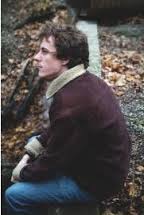Joshua is a song-writer, chaplain at a local nursing home, and a supply-teacher for the local public-school board. He lives in Hamilton on Anishinaabe land with his wife, son, and daughters.
1. How did you get to where you are as an artist?
I suppose the short answer is, I haven’t any idea at all. I am not at all sure that I consider myself an artist, as that seems to me to set me apart from others in some sort of sacred and untouchable place, where the air is rarefied, but I guess that’s where we’re at with art these days. I got to where I am, really, by listening to so many others or by trying to do so. It started with learning piano from my mother, while she worked out gospel hymns on her mother’s piano, and then from my first piano teacher and sticking with all that practice. Early teens brought me a guitar and a few tentative forays into writing my own songs, starting up a band with my cousin and a friend of ours, and just moving on slowly from there. Now, in the mid-thirties, it’s more about listening to others, to stories, trying to distill the human experience into a few moments of words, diarizing some things so as not to forget them, passing on something worth doing to my wife and I’s children. I hope I don’t see it as something fancy but just as something worth doing and hearing.
2. What is your typical day like?
My typical day is framed by the joy of children and of supply-teaching, my day-job which I do not plan to quit. I make lunches, get the kids off to school, and get to various secondary schools in my home-town. I keep a binder with me so I can work on lyrics or hear stories from others and just go from there.
3. What do you enjoy most about living in Hamilton?
Hamilton’s my home-town so it’s nice to know where I’m going throughout the city, at the root of it. What I enjoy most about Hamilton, though, is its utter reality—that is, the sense that folks are authentic—and, generally, the friendliness of other Hamiltonians. It’s a good city, in its bones, or, perhaps, a city that’s trying to be good.
4. Who or what inspires you?
I take inspiration from many different areas but mostly from people who are willing to try and hear and do new things, especially in political arenas. The older I get, the more I think of the world I’ll be leaving to my and others’ children, the more I get inspiration from those few righteous folks who stood up for truth and for justice and for love’s sake. Too, the joy of getting older, if there is a joy to be found in the body’s march toward decay, is that one’s reputation is less an issue and risks can more clearly and happily be taken. You get, I guess, to the point where you can say, Well, this is who I am, what I believe, and what I’m about—all of which, I hope, can be summed up in this phrase, Love your enemies—and you just leave all that on the table.
5. A lot of your lyrics seem to be about social issues. Do you consider your songs to be activist songs?
I would say that most of my songs are activist songs, yes. I tend to shy away from the confessional songs, from the ones that are based on me, I guess, and try to populate them more with characters or some generalized moment of my own working life that I think could resonate with others’ experiences. I would, certainly, like folks to be active, in whatever arena or vocation is calling out to them, instead of inactive, blindly taking things in without examining them in some way. Of course, we can’t live at the fever pitch of examining everything all the time and at every angle, but we sure can do what we can to make, in our small domains, the world a more habitable and humane place to be, thinking so many generations ahead. It’s not a secret, I don’t think, that I consider my politics to be pretty socialist in nature, nor is that probably a surprise for most creative folks to be thinking that way, so those themes – the importance of the human person, of creative and thoughtful dissent from the status quo, the angle toward peace and away from war – are going to appear in my songs in a variety of ways, as that’s the kind of world I want children to inherit and one in which I’d definitely like to live. I hope it’s no surprise to readers that there are more important things to do than make money and, more than doing, to be, simply, in the world so as to love others and to be loved.
6. When people listen to your music, what do you want them to take away from it?
I’m not sure, frankly, what I want them to take from it. Maybe it’s the realization that they’re not alone in their radical thoughts, in their feelings about any situation. At the root, songs, someone said, make you feel a thought and I like that, whoever said it. That union that’s created by a song reminding you that you’re not alone in this world is a union that’s created by the force of love, so I hope people take some love away from it. Love’s the source and the end of it and it’s all we can take away from this world, the ways that we’ve loved and forgiven and cared for one another, especially those who are so unlike us.
7. On your website, you state that you believe that music should, fundamentally, be free. Can you explain?
I’ve got a strong bent toward those in need – I know that particular phrase probably sounds pompous and ridiculous, especially for those who know me well, but I’m still trying so, in wrath, remember mercy – but I don’t want anything getting in the way of folks who want to hear my songs. That’s why I keep on supply-teaching, to fill the wallet, while song-writing and such fills the heart and the soul. That’s why I don’t play much in actual venues anymore unless it’s for those infrequent benefit shows or whatnot and it’s why I play on the corner of Fennell Avenue and Upper James Street. I guess I’ve just dropped off the map of ambition and notoriety and acclaim, happy to just do my quiet little thing in its own way and to see what happens, if anything, from it. I’m not in this vocation to make money of any kind but want to give what I’ve freely received from others, their stories and their lives and their little and lovely ways of being in the world, away into the world. I think we’re meant to live freely, without any medium of exchange, anything getting in the way of giving gifts to one another, especially from the poverty of our own selves. I guess once it becomes a way to make money, these creative acts, whatever they are, then it’s already been lost, though that’s not completely true as I do know some – Jon Brooks, for one – who are striking that difficult balance between the heart of a good song and the fiscal reality of contemporary Canadian society under the scourge of capitalism.
8. What is your dream creative project?
Well, I put out one record in 2008 and that’s, I’ve decided, it for recording. There’s just too much environmental cost to putting out another physical compact disc and I don’t have any interest in putting stuff online on Bandcamp or whatever else is tipping the scales at this point. I did that for awhile but shut down those pages, as best I could, because it became more and more about me checking the statistics and seeing how many people were visiting. There’s still, I confess, a part of me that needs that exterior acclaim but I sense, as I get older, that need fading, too, and it becoming its own reward for its own sake. A few folks have noticed, over the years, which has been a lovely surprise. In any event, I don’t know that I have a dream creative project but I am looking forward, if I can get my act together, to putting out a song-book, hand-made and -sewn, this year entitled Songs For Raised Voices. It’ll be a compendium of what’s been cooking for the past decade since that record, From Shipwreck, and I’ll just hand it all out for free on the street-corner so folks can learn to read some music and to sing along, if they want, and to share it with other folks. Beck did it, so why not, eh?
9. Do you have any advice for aspiring artists or creatives?
I guess the only advice I can give is what I learned myself from others. I’d try and find a mentor, first of all, and then go from there. Also, listen to your own voice and don’t get out there by imitating others, though that’s going to be unavoidable by way of the instruments to which you’re drawn and the music of others that guides you. Too, get comfortable with the long silences and the droughts between the rains. Be ready for whatever comes and don’t force things. If the song’s not coming, it’s not coming, and there’s no reason to get upset about it. Don’t get too precious about the whole thing, either, and just get comfortable with who you are as a song-writer. It’s an odd vocation, sometimes lonely, this stringing about of words and melody, but it’s good to look back on something you’ve made and see it for what it is: a complete hand-made slice of wonder that’s named that moment in the world for you and, with hope, for others, too. I draw a lot of inspiration from my father, who’s a cabinet-maker, and the way he so blithely and joyfully draws all these tools and woods together into something beautiful and useful and from my mother, who’s a nurse who keeps the human person at the heart of it, trying not to make them disappear in the midst of diabetic regulations and the whole Western medical system that does its level best to make that disappearance complete. All that’s to say that you should try and look kindly and lovingly on those who brought you up and on the ways that their decisions shaped yours and the bed over which your life’s river’s running. If I could sum it up, I would say this: be grateful and be open.
10. What's next for you?
I have no idea other than this song-book idea that’s still sticking around, so I guess that’s a sign that it’s still worth doing. I guess we’ll see where the next song comes from and where it goes to next. I don’t like telling folks what a song’s about but the most recent is entitled ‘Lascaux’, written after I saw a small poster in a class-room about the cave paintings there.
Photo by Rachel Novak Guy
You can find Joshua's Bandcamp here.
Story by: Glodeane Brown
If you liked this post, please like, comment, and share.


